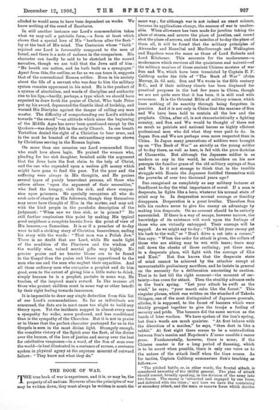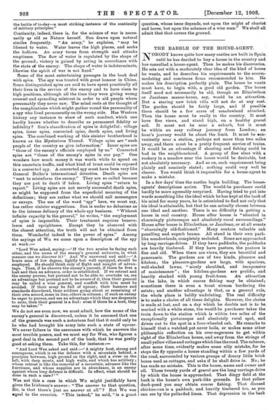THE BOOK OF WAR.
MIRE true book of war is experience, and it is, or may be, the property of all nations. However often the principles of war may be written down, they must always be written in much the same way ; for although war is not indeed an exact science,
because its applications change, the essence of war is unalter- able. When allowance has beet: made for javelins taking the place of stones, and arrows the place of javelins, and round shot the place of arrows, and the midsiles of to-day the place of them all, it will be found that the military principles of
Alexander and Hannibal and Marlborough and Wellington and Napoleon were the same as those of Lord Roberts and Lord Kitchener. This accounts for the modernness—a modernness which survives all the quaintness and naivete—of the military maxims of those ancient Chinese masters of war Sun and Wu, -which have been translated by Captain E. F. Calthrop under the title of "The Book of War" (John Murray, 2s. 6d. net). Son and Wu wrote in the fifth century B.C., and if their military classic has been displaced for practical purposes in the last few years in China, though we are not quite sure that it has been, it is still read with
reverence. It is the Oriental Bible of military science, which loses nothing of its sanctity through being forgotten in practice. And it is not only in China that the maxims of Sun
and Wu have been held to contain all the law and the prophets. China, after all, is not characteristically a fighting country, and Sun and Wu would be thought of there not so much as patriots and national heroes as highly efficient professional men who did what they were paid to do. In Japan Sun and Wu are perhaps even more respeoted than in China. In Japan many generations of soldiers were brought up on " The Book of War" as strictly as the young soldier of to-day there, as well as here, is fed with the pure doctrine of Clausewitz. But although the Japanese soldier is as modern as any in the world, he embroiders on his new precepts the familiar grace of the old military sayings of Sun and Wu. Is it not strange to think that in the terrible struggle with Russia the Japanese fortified themselves with the proverbs of over two thousand years ago P Sun recognised as completely as any military lecturer at Sandhurst to-day the vital importance of moral. If a man is desperate, he fights like a hero, whatever his normal state of mind may be. In desperation normal courage or timidity disappears. Desperation is a great leveller. Therefore Sun tells his readers never to give the enemy an advantage by making him desperate. On no account should he be entirely surrounded. If there is a way of escape, however narrow, the knowledge of its existence will work upon the feelings of
those who are virtually entrapped. Their courage will be sapped. As we might say to-day : "Don't let your enemy get his back to the wall," or " Don't drive a rat into a corner," Sun says: " When the order for attack is given, the collars of those who are sitting may be wet with tears ; tears may roll down the cheeks of those reclining; yet these men,
in a desperate place, will fight with the courage of Chu and Kuei." But Sun knows that the desperate state of mind cannot be achieved by the attacker except at unwarrantable preliminary sacrifices, and he insists in general on the necessity for a deliberation amounting to caution.
That is to last till the right moment—the moment of cer- tainty—has come for attack. Then the stealthy advance ends
in the lion's spring. "Let your attack be swift as the wind," he says; "your march calm like the forest." This
singular phrase, which was written on the standard of Takeda Shingen, one of the most distinguished of Japanese generals, alludes, it is supposed, to the forest of banners which were thickly grouped together to give the troops a feeling of security and pride. The banners did the same service as the bands of later warfare. We have spoken of the lion's spring, but Sun's words are much quainter. "At first behave with the discretion of a maiden," he says, "then dart in like a
rabbit." At first sight there seems to be a contradiction between Sun's maxim and Napoleon's L'uomo assalito a mono preso. Fundamentally, however, there is none; if the Chinese master is for a long period of finessing, which is to be secret when possible, there is only one voice as to the nature of the attack itself when the time comes. Is for tactics, Captain Calthrop summarises Sun's teaching as
follows :—
"The pitched battle, or, in other words, the frontal attack, is considered unworthy of the skilful general. The plan of attack should consist, broadly speaking, in the division of the army into two forces. The enemy is 'attracted and engaged by one force, and defeated with the other ;' and here we have the containing or secondary attack, and the main or reserve force which decides
the battle of to-day—a most striking instance of the continuity of military principles."
Continuity, indeed, there is, for the science of war is neces- sarily Its old as Nature herself. Sun draws upon natural similes frequently. " An army," he explains, " may be likened to water. Water leaves the high places, and seeks the hollows. An army turns from strength and attacks emptiness. The flow of water is regulated by the shape of the ground ; victory is gained by acting in accordance with the state of the enemy. The shape of water is indeterminate, likewise the spirit of war is not fixed."
Some of the most entertaining passages in the book deal with spies. The spy was treated with great honour in China.
Some distinguished spies are said to have spent practically all their lives in the service of the enemy and to have risen to high positions, although all the time they were giving wrong counsel and spreading mistrust in order to aid people whom presumably they never saw. The mind reels at the thought of the complications which might gather round the personality of a spy who lived permanently on the wrong side. Has Western history any instance to show of such conduct, which one hardly knows whether to describe as permanent fidelity or infidelity P Sun's classification of spies is delightful : village spies, inner spies, converted spies, death spies, and living spies. The combined working of this sinister brotherhood is known as the Mysterious Thread. Village spies are " such people of the country as give information." Inner spies are " those of the enemy's officials employed by us." Converted spies are " those of the enemy's spies in our pay." One wonders how much money it was worth while to spend on this uncertain traffic, and what kind of trust could be reposed in a converted spy. A converted spy must have been very like General Buller's international detective. Death spies are " sent to misinform the enemy." They are so called because they are put to death if taken. Living spies " return to report." Living spies are not merely successful death spies, as might be supposed from the superficial meaning of the definitions ; they are rather what we should call messengers or envoys. The use of the word "spy" here, we must say, has rather sinister suggestions. Sun is under no delusions as to the intense delicacy of the whole spy business. " Without infinite capacity in the general," he writes, " the employment of spies is impossible. Their treatment requires benevo- lence and uprightness. Except they be observed with the closest attention, the truth will not be obtained from them. Wonderful indeed is the power of spies." Among the sayings of Wu we come upon a description of the spy at work :—
"Lord Wen asked, saying If the two armies be facing each other, and the name of the enemy's general unknown, in what manner can we discover it?' And Wu answered and said A brave man of low degree, lightly but well equipped, should be employed. He should think only of flight and naught of advan- tage. Then, if he observe the enemy's pursuit, if there be first a halt and then an advance, order is established. If we retreat and the enemy pursue, but pretend not to be able to overtake us, see an advantage but pretend not to be aware of it, then their general may be called a wise general, and conflidt with him must be avoided. If their army be full of uproar; their banners and standards disordered, their soldiers going about or remaining of their own accord, some in line, others in column ; if such an enemy be eager to pursue, and see an advantage which they are desperate to seize, then their general is a fool: even if there be a host, they may be taken."
We do not see even now, we must admit, how the name of the enemy's general is discovered, unless it be assumed that one
of the generals was such a notorious fool that it could only be he who had brought his army into such a state of uproar. Wu never falters in the assurance with which he answers the most terrible posers, and we must say for Wen, who figures a good deal in the second part of the book, that he was pretty good at asking them. Take this, for instance:—
" And Lord Was asked and said A mighty host, strong and courageous, which is on the defence with a mountain behind, a precipice between, high ground on the right, and a river on the left, with deep moats, and high walls, and which has artillery ; whose retreat is like the removal of a mountain, advance like the hurricane, and whose supplies are in abundance, is an enemy against whom long defence is difficult. In effect, what should be done in such a case ?
Was not this a case in which Wu might justifiably have given the Irishman's answer : " The answer to that question, Sir, is that there's just no answer at all" ? But Wu was equal to the occasion. " This indeed," he said, " is a great question, whose issue depends, not upon the might of chariot and horse, but upon the schemes of a wise man." We shall all admit that that covers the ground.































































 Previous page
Previous page